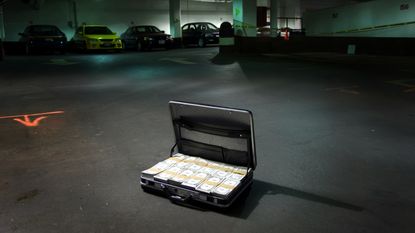What Not to Do if an Employee or Loved One Is Kidnapped
Businesses need to have a crisis plan in place so that everyone knows what to do and how to do it. Sometimes, calling the authorities isn’t recommended.


“I am the CEO of an international consulting firm located in the Pacific Northwest. We routinely send our people to every corner of the globe. Recently, we had a real scare when a team sent to Turkey failed to respond to our phone calls and texts. What came to mind was that they were abducted, and we expected a ransom demand — which never came, because it was a false alarm. They had been out of cell phone range. But that fear left us wondering how we should respond to a real kidnapping. I’ll bet this topic would be of interest to many of your readers. Thanks, ‘Cindy.’”
Advice from a kidnap negotiator
I discussed Cindy’s question with U.K.-based Scott Walker, considered one of the world’s most experienced kidnap-for-ransom negotiators. He spent 16 years as a Scotland Yard detective in covert, counterterrorism and kidnap operations.
Walker distills the lessons learned from high-profile abductions and presents readers with a by-the-numbers approach to successful negotiations in daily life in his recently released book, Order Out of Chaos, which keeps you on the edge of your seat.

Sign up for Kiplinger’s Free E-Newsletters
Profit and prosper with the best of expert advice on investing, taxes, retirement, personal finance and more - straight to your e-mail.
Profit and prosper with the best of expert advice - straight to your e-mail.
I asked, “When suddenly thrust into a situation where you desperately want the release of hostages — in a domestic situation, in the workplace, or as a cyberattack victim — what must you not do to avoid making the situation even more perilous?”
1. Do not panic or allow yourself to be ruled by emotions.
The first thing not to do is to allow emotions to get the better of you — panic makes it impossible to think straight, Walker underscores. This will prevent you from making effective decisions, and you could ultimately wind up with a far worse situation. By harnessing strong emotions, you are far better able to work with others in a cooperative effort to reach a positive outcome.
2. Do not go into denial, bury your head in the sand or allow yourself to become frozen with fear. Do not catastrophize.
Any hostage situation can lead to catastrophizing. You don’t want to blow the situation out of proportion, exaggerate or make it worse than it is. In an almost manic state of mind like that, you can’t be effective in dealing with the various parties. “A successful outcome requires coming from a place of calmness and equanimity,” Walker says.
3. Do not fail to develop a crisis management plan, involving key decision makers, well before an incident occurs.
Especially for organizations that send people around the world, a plan in place means that you will know who needs to be involved, who the decision makers are and the key steps required to manage the situation as effectively as possible.
Without a plan, there is chaos, with people all running their own agenda, and egos leading the charge. This allows the kidnappers to sow the seeds of distrust.
4. Do not fail to realize that trust is the most critical element in any hostage negotiation.
“Establishing a mutual trusting relationship with the kidnappers is absolutely essential so that when the ransom money is handed over, they will release the hostages or, in a ransomware attack, release the decryption codes,” Walker says. Also, that trust lets them know you are not going to track or double-cross them.
He adds, “Creating this mutually trusting relationship begins by actively listening to their needs, showing empathy, helping them feel seen, heard and understood.” Offering your help results in cooperation and collaboration, a feeling that “we're in this together, and we're going to find a solution that both of us feel as if we've got a good deal.”
“Without that trust, you're not going to get a deal,” Walker points out. “This is where control of your own ego is so important. Yes, you are furious, but do not see yourself as Rambo! Do not convey the idea that they are going to lose and that you will do your best to make it happen!”
5. Do not fail to know when and if to involve law enforcement, even if you’re told not to by the kidnappers.
“If a family member or colleague is kidnapped in the U.S. or in Western Europe,” Walker notes, “absolutely involve law enforcement. However, in other parts of the world, sometimes the police, law enforcement and military are involved, or they turn a blind eye to kidnapping and extortion.”
Walker adds, “Even if they aren’t with the bad guys, most countries do not have people skilled to handle these sensitive matters that can drag on for months, and therefore attempt a rescue that can lead to death of the hostage.”
Kidnapping is rarely random
Concluding our interview, Walker cautions, “Ninety-nine percent of kidnappings are not just random. Victims weren’t in the wrong place at the wrong time. They were targeted. Significant planning and preparation have gone into it, or the kidnapping was a direct result of personal information posted online. We need to be more circumspect about what we post and realize that few people need to know (certain details). Some might even become jealous, or see you as an easy way to score thousands of dollars.”
Order Out of Chaos is practical, accessible and well-written. It is a great read and would make an excellent gift for university business majors.
Dennis Beaver practices law in Bakersfield, Calif., and welcomes comments and questions from readers, which may be faxed to (661) 323-7993, or e-mailed to Lagombeaver1@gmail.com. And be sure to visit dennisbeaver.com.
Related Content

After attending Loyola University School of Law, H. Dennis Beaver joined California's Kern County District Attorney's Office, where he established a Consumer Fraud section. He is in the general practice of law and writes a syndicated newspaper column, "You and the Law." Through his column he offers readers in need of down-to-earth advice his help free of charge. "I know it sounds corny, but I just love to be able to use my education and experience to help, simply to help. When a reader contacts me, it is a gift."
-
 Don’t Forget to Update Beneficiaries After a Gray Divorce
Don’t Forget to Update Beneficiaries After a Gray DivorceSome states automatically revoke a former spouse as a beneficiary on some accounts. Waivers can be used, too. Best not to leave it up to your state, though.
By Andrew Hatherley, CDFA®, CRPC® Published
-
 What’s the Difference Between a CPA and a Tax Planner?
What’s the Difference Between a CPA and a Tax Planner?CPAs do the important number crunching for tax preparation and filing, but tax planners look at the big picture and come up with tax-saving strategies.
By Joe F. Schmitz Jr., CFP®, ChFC® Published
-
 Don’t Forget to Update Beneficiaries After a Gray Divorce
Don’t Forget to Update Beneficiaries After a Gray DivorceSome states automatically revoke a former spouse as a beneficiary on some accounts. Waivers can be used, too. Best not to leave it up to your state, though.
By Andrew Hatherley, CDFA®, CRPC® Published
-
 What’s the Difference Between a CPA and a Tax Planner?
What’s the Difference Between a CPA and a Tax Planner?CPAs do the important number crunching for tax preparation and filing, but tax planners look at the big picture and come up with tax-saving strategies.
By Joe F. Schmitz Jr., CFP®, ChFC® Published
-
 Charitable Remainder Trust: The Stretch IRA Alternative
Charitable Remainder Trust: The Stretch IRA AlternativeThe SECURE Act killed the stretch IRA, but a properly constructed charitable remainder trust can deliver similar benefits, with some caveats.
By Brandon Mather, CFP®, CEPA, ChFEBC® Published
-
 Three Ways to Take Control of Your Money During Financial Literacy Month
Three Ways to Take Control of Your Money During Financial Literacy MonthBudgeting, building an emergency fund and taking advantage of a multitude of workplace benefits can get you on track and keep you there.
By Craig Rubino Published
-
 How Did O.J. Simpson Avoid Paying the Brown and Goldman Families?
How Did O.J. Simpson Avoid Paying the Brown and Goldman Families?And now that he’s died, will the families of Nicole Brown Simpson and Ron Goldman be able to collect on the 1997 civil judgment?
By John M. Goralka Published
-
 Why You Shouldn’t Let High Interest Rates Seduce You
Why You Shouldn’t Let High Interest Rates Seduce YouWhile increased interest rates are improving the returns on high-yield savings accounts, that may not be an effective place to park your money for the long term.
By Kelly LaVigne, J.D. Published
-
 Need to Build an Emergency Fund? Seven Steps to Get There
Need to Build an Emergency Fund? Seven Steps to Get ThereHaving a safety net can mean peace of mind on top of being able to maintain your lifestyle if a financial emergency strikes.
By Justin Stivers, Esq. Published
-
 Which Type of Life Insurance Is Right for You?
Which Type of Life Insurance Is Right for You?Life insurance isn’t a one-size-fits-all option. Here are the differences between term life, whole life and indexed universal life insurance.
By Jay Dorso Published